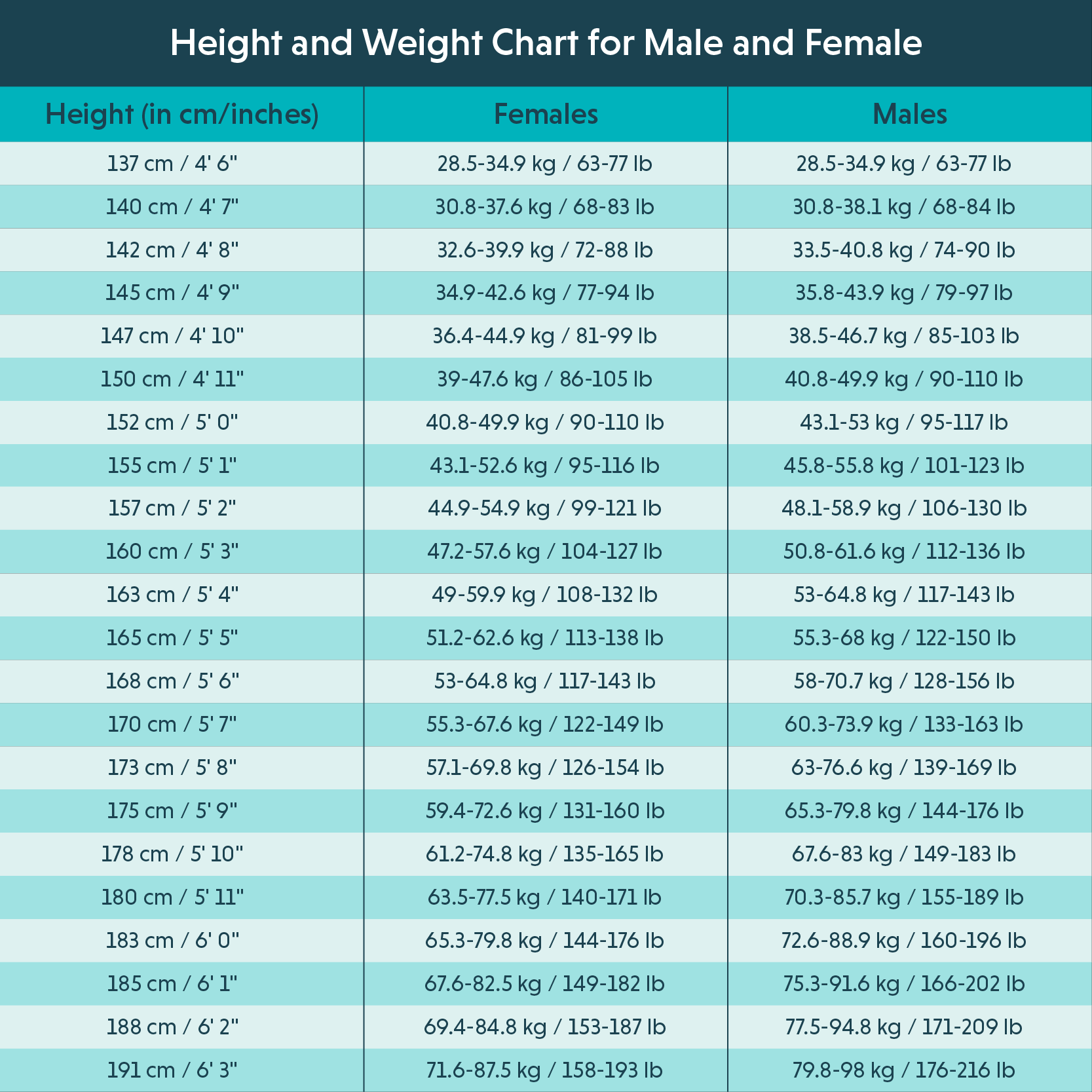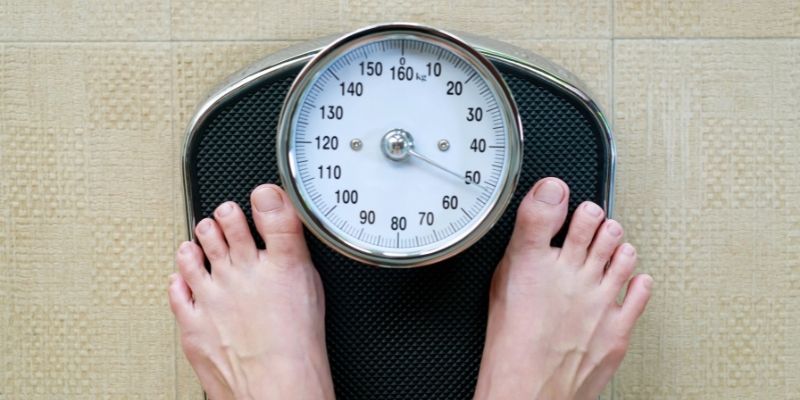Height Weight Chart According To Age For Male & Female
Determining the ideal body weight is not just about aesthetics; it’s a crucial aspect of overall health and well-being. But what exactly is the ideal body weight, and how can you calculate it? In this article, we’ll explore why knowing your ideal body weight matters and how it can benefit you in your journey towards better health.
What is Ideal Body Weight?
Ideal body weight refers to the weight range that is optimal for an individual’s height and gender. It’s not about conforming to societal standards of beauty but rather about achieving a weight that promotes good health and reduces the risk of chronic diseases.
Top 12 Factors That Influence Body Weight:
Here are some of the most common factors affecting body weight. By considering them, one can make informed decisions to achieve and maintain a healthy weight:
- Genetics: Genetic predisposition can significantly influence body weight. Your genes directly affect your metabolism and fat storage patterns.
- Height: Height is a factor to consider when assessing ideal body weight and body mass index (BMI).
- Food habits: Dietary choices, including calorie intake, food composition, and portion sizes, have a bearing on body weight.
- Medical conditions: Certain medical conditions, such as thyroid disorders, polycystic ovary syndrome (PCOS), and insulin resistance, affect metabolism. This, in turn, leads to weight gain.
- Hormonal health: Hormonal imbalances affect your appetite, metabolism, and fat storage.
- Medications: Some medications may cause weight gain as a side effect. They increase appetite, slow down metabolism, and can also alter fat storage.
- Eating disorders: Binge eating disorder, bulimia nervosa, and anorexia nervosa are eating disorders that cause significant body weight fluctuations.
- Substance abuse: Use of drugs, tobacco, or alcohol affect metabolism by changing appetite.
- Lifestyle: Physical activity levels, sedentary behaviour, and dietary habits affect body weight and composition.
- Stress: High-stress levels and irregular working hours impact eating habits and disrupt sleep patterns. As a result, it adversely affects metabolism and weight management.
- Inadequate sleep: Chronic sleep deprivation has a poor effect on hormonal balance. It increases appetite and impairs metabolism, leading to weight gain.
- Mental health: Appetite regulation, as well as motivation to remain physically active, is affected by depression, anxiety, and stress.
Calculating Your Ideal Body Weight:
Hamwi’s equation is a formula by Dr. G.J. Hamwi to estimate ideal body weight based on height. Since 1964, it provides a simple and straightforward method for calculating an individual’s ideal weight, taking into account both height and gender.
The equation varies slightly for men and women:
For men: Ideal body weight (in kilograms) = 48.0 kg + 2.7 kg for each inch over 5 feet.
For women: Ideal body weight (in kilograms) = 45.5 kg + 2.2 kg for each inch over 5 feet.
It’s important to note that Hamwi’s equation is a general guideline and may not account for variations in body composition or other individual factors. Therefore, we recommend consulting a healthcare professional for personalised recommendations regarding weight management.
Height And Weight Chart For Male And Female:
Height and weight charts differ for men and women due to variations in body composition and metabolism. Ideal weight ranges are based on height, with separate recommendations for different age groups. By consulting these charts, individuals can gain insights into their ideal weight range and work towards achieving or maintaining a healthy weight.
Adults Weight To Height Ratio Chart
The table below shows both metric and imperial measurements of weight as per height for adult women and men:
Height Weight Chart For Female
| Height (in cm/inches) | Females |
| 137 cm / 4′ 6″ | 28.5-34.9 kg / 63-77 lb |
| 140 cm / 4′ 7″ | 30.8-37.6 kg / 68-83 lb |
| 142 cm / 4′ 8″ | 32.6-39.9 kg / 72-88 lb |
| 145 cm / 4′ 9″ | 34.9-42.6 kg / 77-94 lb |
| 147 cm / 4′ 10″ | 36.4-44.9 kg / 81-99 lb |
| 150 cm / 4′ 11″ | 39-47.6 kg / 86-105 lb |
| 152 cm / 5′ 0″ | 40.8-49.9 kg / 90-110 lb |
| 155 cm / 5′ 1″ | 43.1-52.6 kg / 95-116 lb |
| 157 cm / 5′ 2″ | 44.9-54.9 kg / 99-121 lb |
| 160 cm / 5′ 3″ | 47.2-57.6 kg / 104-127 lb |
| 163 cm / 5′ 4″ | 49-59.9 kg / 108-132 lb |
| 165 cm / 5′ 5″ | 51.2-62.6 kg / 113-138 lb |
| 168 cm / 5′ 6″ | 53-64.8 kg / 117-143 lb |
| 170 cm / 5′ 7″ | 55.3-67.6 kg / 122-149 lb |
| 173 cm / 5′ 8″ | 57.1-69.8 kg / 126-154 lb |
| 175 cm / 5′ 9″ | 59.4-72.6 kg / 131-160 lb |
| 178 cm / 5′ 10″ | 61.2-74.8 kg / 135-165 lb |
| 180 cm / 5′ 11″ | 63.5-77.5 kg / 140-171 lb |
| 183 cm / 6′ 0″ | 65.3-79.8 kg / 144-176 lb |
| 185 cm / 6′ 1″ | 67.6-82.5 kg / 149-182 lb |
| 188 cm / 6′ 2″ | 69.4-84.8 kg / 153-187 lb |
| 191 cm / 6′ 3″ | 71.6-87.5 kg / 158-193 lb |
| 193 cm / 6′ 4″ | 73.5-89.8 kg / 162-198 lb |
| 195 cm / 6′ 5″ | 75.7-92.5 kg / 167-204 lb |
Height Weight Chart For Male
| Height (in cm/inches) | Males |
| 137 cm / 4′ 6″ | 28.5-34.9 kg / 63-77 lb |
| 140 cm / 4′ 7″ | 30.8-38.1 kg / 68-84 lb |
| 142 cm / 4′ 8″ | 33.5-40.8 kg / 74-90 lb |
| 145 cm / 4′ 9″ | 35.8-43.9 kg / 79-97 lb |
| 147 cm / 4′ 10″ | 38.5-46.7 kg / 85-103 lb |
| 150 cm / 4′ 11″ | 40.8-49.9 kg / 90-110 lb |
| 152 cm / 5′ 0″ | 43.1-53 kg / 95-117 lb |
| 155 cm / 5′ 1″ | 45.8-55.8 kg / 101-123 lb |
| 157 cm / 5′ 2″ | 48.1-58.9 kg / 106-130 lb |
| 160 cm / 5′ 3″ | 50.8-61.6 kg / 112-136 lb |
| 163 cm / 5′ 4″ | 53-64.8 kg / 117-143 lb |
| 165 cm / 5′ 5″ | 55.3-68 kg / 122-150 lb |
| 168 cm / 5′ 6″ | 58-70.7 kg / 128-156 lb |
| 170 cm / 5′ 7″ | 60.3-73.9 kg / 133-163 lb |
| 173 cm / 5′ 8″ | 63-76.6 kg / 139-169 lb |
| 175 cm / 5′ 9″ | 65.3-79.8 kg / 144-176 lb |
| 178 cm / 5′ 10″ | 67.6-83 kg / 149-183 lb |
| 180 cm / 5′ 11″ | 70.3-85.7 kg / 155-189 lb |
| 183 cm / 6′ 0″ | 72.6-88.9 kg / 160-196 lb |
| 185 cm / 6′ 1″ | 75.3-91.6 kg / 166-202 lb |
| 188 cm / 6′ 2″ | 77.5-94.8 kg / 171-209 lb |
| 191 cm / 6′ 3″ | 79.8-98 kg / 176-216 lb |
| 193 cm / 6′ 4″ | 82.5-100.6 kg / 182-222 lb |
| 195 cm / 6′ 5″ | 84.8-103.8 kg / 187-229 lb |
Correlation to BMI
To understand one’s healthy weight as per height, consider the above charts along with Body Mass Index (BMI). This helps assess with ease if one needs medical attention.
BMI is calculated as follows:
| BMI | Inference |
| BMI below 18.5 | Indicates being underweight |
| BMI between 18.5 and 24.9 | Falls within the normal/healthy weight range. |
| BMI between 25.0 and 29.9 | Suggests overweight status |
| A BMI of 30.0 or higher | Indicates obesity |
It is noteworthy that even though BMI is used widely, experts debate its accuracy in health assessment. Excess weight is not an automatic indication of health problems. However, obesity does increase the risk of developing health complications eventually. It is best to seek professional guidance from a doctor or healthcare provider to manage your weight and health parameters.
Importance And Benefits Of Understanding Your Ideal Body Weight:
Understanding your ideal body weight is essential for several reasons:
- Health Monitoring: Your ideal body weight serves as a valuable benchmark for monitoring your health and fitness goals. By comparing it to your current weight, you can track your progress and make adjustments to your lifestyle as needed.
- Risk Assessment: Maintaining a healthy weight reduces the risk of various chronic diseases, including diabetes, heart disease, and certain cancers. Knowing your ideal body weight helps you assess your risk level and take proactive steps to protect your health.
- Goal-Setting: Setting realistic weight loss or weight gain goals is crucial for success. Your ideal body weight provides a tangible target to work towards, making it easier to establish achievable milestones along your wellness journey.
- Customised Approach: Unlike generic weight charts, Hamwi’s equation offers an estimate tailored to your height and gender. This customised approach enhances accuracy and ensures that weight recommendations align with your unique body composition.
Top 10 Tips To Maintain Ideal Weight:
Here are the top ten tips that will help you maintain your ideal weight:
- Eat Balanced Meals: Opt for meals rich in fruits, vegetables, lean proteins, whole grains, and healthy fats daily.
- Cut down on sugary intake: Sweets, cakes, desserts, and sugary drinks have excess calories. Switch to healthy options with no added sugars instead.
- Watch Your Portion Sizes: Being mindful of serving sizes, helps prevent overeating, especially when dining out or snacking.
- Stay Active: Incorporate regular physical activity into your routine. Going for daily walks of 40-45 minutes at a medium pace or engaging in cardio, strength training, and flexibility exercises helps boost fitness and burn calories.
- Stay Hydrated: Drink enough water throughout the day. Water helps flush out toxins and keeps you hydrated and satiated, preventing overeating.
- Sleep adequately: Aim for seven to nine hours of quality sleep each night. It helps regulate your hormones, support metabolism, and promote overall health.
- Control the intake of processed foods: Reducing intake of processed foods helps cut down unhealthy fats, sugars, excessive salt, and empty calories. Go for healthy snacking and fruits instead.
- Manage Stress: Stress leads to emotional eating. Engage in stress-management activities and techniques such as deep breathing, meditation, yoga, or outdoor activities to manage your stress levels.
- Keep A Count: Always be aware of your food intake, track your physical activity, and maintain an account of your daily progress towards your weight loss goals. Journaling apps and support groups are great ways to maintain motivation.
- Seek Support: Your weight management goals seem more doable when you are surrounded by a supportive network of friends, family, or healthcare professionals. Constant encouragement and guidance will keep you on track.
Maintaining an ideal weight is crucial for promoting overall health and reducing the risk of chronic diseases. Height and weight charts offer valuable guidance for individuals to assess their weight status and make informed decisions about their health. By following tips to maintain an ideal weight, individuals can improve their overall well-being and reduce the risk of obesity-related health complications. It’s essential to prioritise healthy lifestyle habits, including balanced nutrition, regular exercise, and stress management, to achieve and maintain a healthy weight throughout life.
Stay tuned for more tips on weight management!
Our certified subject matter experts do extensive research and collate facts from reputed scientific journals and international studies to create informative and engaging articles related to all your dermatology concerns. They strive to help you decipher medical jargon, distinguish fact from fiction and overcome paranoia. Our qualified medical board or expert panel goes a step further to verify these facts based on their rich academic knowledge, vast clinical experience and critical industry insights to ensure you consume only medically accurate content that empowers you to make informed decisions about your hair and skin-care treatments and weight management. Check out our Editorial policy for further details
https://www.cdc.gov/healthyweight/assessing/bmi/adult_bmi/index.htmlhttps://www.euro.who.int/en/health-topics/disease-prevention/nutrition/a-healthy-lifestyle/body-mass-index-bmi
https://www.nhlbi.nih.gov/health/educational/lose_wt/risk.htm
https://www.nhlbi.nih.gov/health/educational/healthdisp/pdf/tipsheets/Are-You-at-a-Healthy-Weight.pdf
https://www.sciencedirect.com/science/article/pii/S0002916523179731









